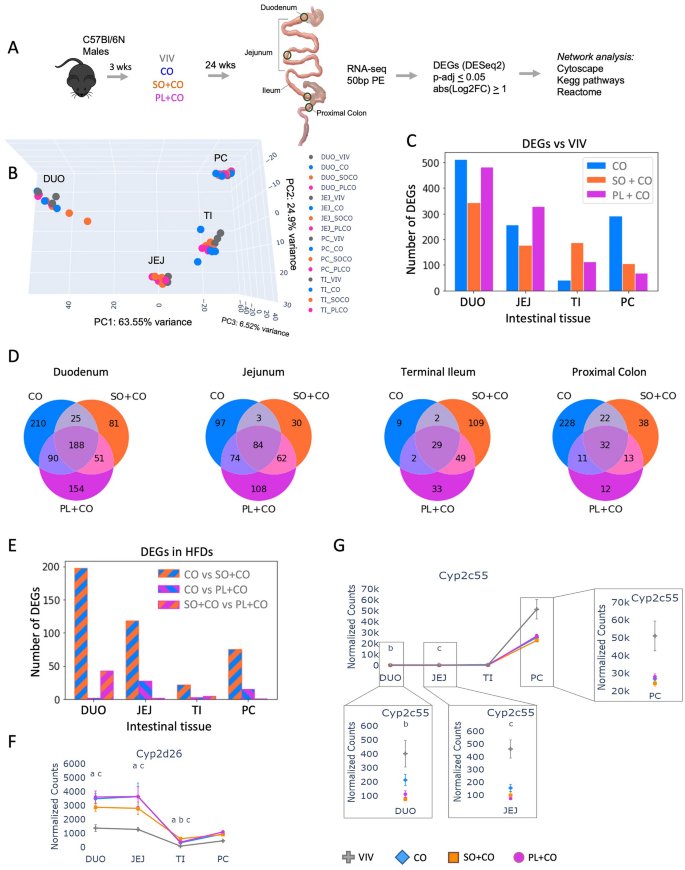2024-01-03 カリフォルニア大学リバーサイド校(UCR)
◆マウスに異なる高脂肪ダイエットを与え、腸の全ての部分で遺伝子変化を観察した結果、これらのダイエットは遺伝子発現に懸念すべき変化を引き起こしました。特に、免疫システム遺伝子の損傷や有害な腸内細菌の増加が確認され、COVID-19感染リスクが高まる可能性が示唆されました。
<関連情報>
- https://news.ucr.edu/articles/2024/01/03/new-reasons-eating-less-fat-should-be-one-your-resolutions
- https://www.nature.com/articles/s41598-023-49555-7
- https://journals.plos.org/plosone/article?id=10.1371/journal.pone.0132672
様々な高脂肪食がマウス腸内の遺伝子発現とマイクロバイオームに与える影響 Impact of various high fat diets on gene expression and the microbiome across the mouse intestines
Jose Martinez-Lomeli,Poonamjot Deol,Jonathan R. Deans,Tao Jiang,Paul Ruegger,James Borneman & Frances M. Sladek
Scientific Reports Published:27 December 2023
DOI:https://doi.org/10.1038/s41598-023-49555-7

Abstract
High fat diets (HFDs) have been linked to several diseases including obesity, diabetes, fatty liver, inflammatory bowel disease (IBD) and colon cancer. In this study, we examined the impact on intestinal gene expression of three isocaloric HFDs that differed only in their fatty acid composition—coconut oil (saturated fats), conventional soybean oil (polyunsaturated fats) and a genetically modified soybean oil (monounsaturated fats). Four functionally distinct segments of the mouse intestinal tract were analyzed using RNA-seq—duodenum, jejunum, terminal ileum and proximal colon. We found considerable dysregulation of genes in multiple tissues with the different diets, including those encoding nuclear receptors and genes involved in xenobiotic and drug metabolism, epithelial barrier function, IBD and colon cancer as well as genes associated with the microbiome and COVID-19. Network analysis shows that genes involved in metabolism tend to be upregulated by the HFDs while genes related to the immune system are downregulated; neurotransmitter signaling was also dysregulated by the HFDs. Genomic sequencing also revealed a microbiome altered by the HFDs. This study highlights the potential impact of different HFDs on gut health with implications for the organism as a whole and will serve as a reference for gene expression along the length of the intestines.
大豆油はマウスにおいてココナッツオイルやフルクトースよりも肥満および糖尿病誘発性が高い: 肝臓の役割の可能性 Soybean Oil Is More Obesogenic and Diabetogenic than Coconut Oil and Fructose in Mouse: Potential Role for the Liver
Poonamjot Deol,Jane R. Evans,Joseph Dhahbi,Karthikeyani Chellappa,Diana S. Han,Stephen Spindler,Frances M. Sladek
PLOS ONE Published: July 22, 2015
DOI:https://doi.org/10.1371/journal.pone.0132672
Abstract
The obesity epidemic in the U.S. has led to extensive research into potential contributing dietary factors, especially fat and fructose. Recently, increased consumption of soybean oil, which is rich in polyunsaturated fatty acids (PUFAs), has been proposed to play a causal role in the epidemic. Here, we designed a series of four isocaloric diets (HFD, SO-HFD, F-HFD, F-SO-HFD) to investigate the effects of saturated versus unsaturated fat, as well as fructose, on obesity and diabetes. C57/BL6 male mice fed a diet moderately high in fat from coconut oil and soybean oil (SO-HFD, 40% kcal total fat) showed statistically significant increases in weight gain, adiposity, diabetes, glucose intolerance and insulin resistance compared to mice on a diet consisting primarily of coconut oil (HFD). They also had fatty livers with hepatocyte ballooning and very large lipid droplets as well as shorter colonic crypt length. While the high fructose diet (F-HFD) did not cause as much obesity or diabetes as SO-HFD, it did cause rectal prolapse and a very fatty liver, but no balloon injury. The coconut oil diet (with or without fructose) increased spleen weight while fructose in the presence of soybean oil increased kidney weight. Metabolomics analysis of the liver showed an increased accumulation of PUFAs and their metabolites as well as γ-tocopherol, but a decrease in cholesterol in SO-HFD. Liver transcriptomics analysis revealed a global dysregulation of cytochrome P450 (Cyp) genes in SO-HFD versus HFD livers, most notably in the Cyp3a and Cyp2c families. Other genes involved in obesity (e.g., Cidec, Cd36), diabetes (Igfbp1), inflammation (Cd63), mitochondrial function (Pdk4) and cancer (H19) were also upregulated by the soybean oil diet. Taken together, our results indicate that in mice a diet high in soybean oil is more detrimental to metabolic health than a diet high in fructose or coconut oil.


